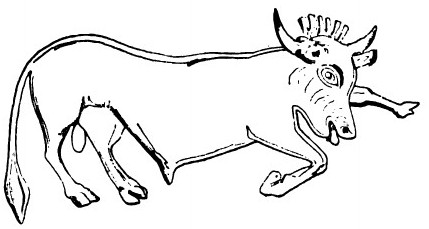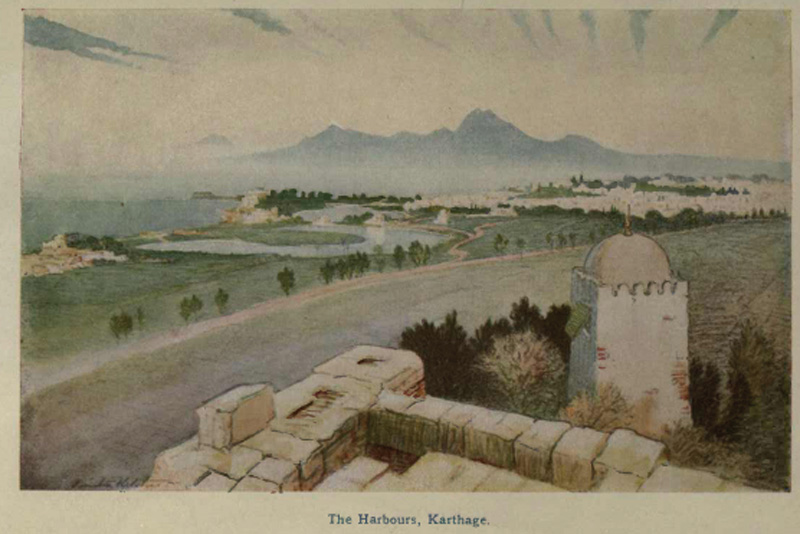
|


ST. AUGUSTINE (A. D. 354-386) WEEPS FOR QUEEN DIDO `SLAIN WITH
THE SWORD [OF AENEAS] AND FLYING TO THE DEPTH'
 .. Almost the most interesting
thing to me about the story of Dido at
Carthage is the chapter that St. Augustine, who was taught and taught
himself in the University of Carthage, has to say about his reading of
the story of Carthage itself:
.. Almost the most interesting
thing to me about the story of Dido at
Carthage is the chapter that St. Augustine, who was taught and taught
himself in the University of Carthage, has to say about his reading of
the story of Carthage itself:
``For certainty the first lessons, which formed in me the enduring power
of reading books and writing what I chose, were better because more
solid than the latter, in which I was obliged to learn by heart the
wanderings of Aeneas, forgetting my own wanderings, and to weep for the
death of Dido, who slew herself for love, while I looked with dry eyes
on my own most unhappy death, wandering far from Thee, O God, my life.
For what is so pitiful as an unhappy wretch who pities not himself, who
has tears for the death of Dido, because she loved Aeneas, but none of
his own death, because he loves not Thee?
O God, the light of my heart, Thou hidden bread of my soul, Though
mighty husband of my mind and of the bosom of my thought, I loved Thee
not. I lived in adultery away from Thee, and all men cried unto me, Well
done! well done! For the friendship of this world is adultery against
Thee. Well done! well done! men cry, till one is ashamed not to be even
as they. For this I had no tears, but I could weep for Dido `slain with
the sword and flying to the depths,' while I was myself flying from Thee
into the depths of Thy creation, earth returning to earth. And if I was
forbidden to read these tales, I grieved; because I might not read what
caused me grief. Such lessons were thought more elevating and profitable
than mere reading or writing. What madness is this!
``But now Thy truth, O my God, cry aloud in my soul, and say unto me,
Not so, not so; the earlier teaching was the better. For lo, I would far
rather forget the wanderings of Aeneas, and everthing of the kind, than
how to read and write. Truly over the door of the grammar school there
hangs a curtain, yet is that curtain the shroud of falsehood, not the
veil of mysteries. Let not those, whom no longer I fear, cry out against
me, while I confess unto Thee, O my God, the promptings of my soul, and
acquiesce in the condemnation of my evil ways, that I may love Thy good
ways. Let not the buyers or sellers of grammar cry out against me.
Because if I were to ask them whether the poet speaks the truth, when he
says that Aeneas came to Carthage, the unlearned would answer that they
do not know, the learned that he does not.
``But, if I were to ask how the name of Aeneas is spelled, all who have
learned spelling would answer rightly, in accordance with the convention
by which men have regulated the use of the alphabet. And again, if I
were to ask which it would be most inconvenient to forget, the art of
reading or writing, or these poetic fictions, who does not see what
answer a man would have to give, unless he had wholly forgotten
himself.''
To the Carthaginians of Augustine's time, at any rate, Dido was a woman,
not a goddess. And how much more precious the humanness of Augustine
than his homilies, even if they did teach the Church her own mind.
Pages 309-311 of CARTHAGE AND TUNIS: THE OLD AND NEW GATES OF
THE ORIENT, by Douglas Sladen, Vol. 1, Hutchinson & Co., London
1906.
 Carthage, 1929 (Vanished Cities of Northern Africa, Mrs. Steuart
Erskine, London : Hutchinson, 2nd Edition)
Carthage, 1929 (Vanished Cities of Northern Africa, Mrs. Steuart
Erskine, London : Hutchinson, 2nd Edition)
|
|




